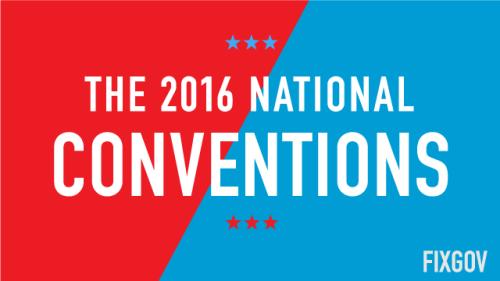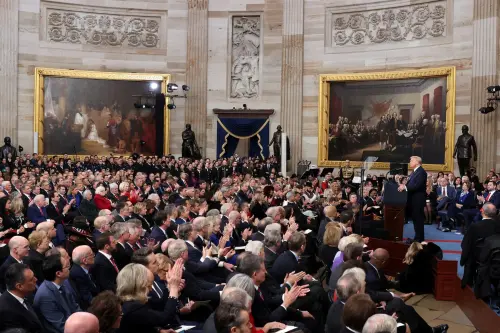Editor’s note: This post originally appeared in Democracy Journal.
Successful acceptance speeches at national party conventions accomplish two tasks: they lay out what is at stake in the forthcoming election in clear, unmistakable terms; and they do what is necessary in the circumstances of the times to build majority support, not only for the nominee personally, but also for the nominee’s strategy for surmounting the most urgent and important problems of the day. Although not every presidential candidate enters the general election contest with realistic prospects of victory, each has the opportunity to play the hand they’ve been dealt either well or badly, and, typically, we can judge which is which.
There are, then, three possible political situations nominees can face as they craft their acceptance speeches. They may enjoy the luxury of already existing majority support, in which case their task is to mobilize their supporters and maximize their victory. They may face a closely divided nation, in which case they must decide on the best course for building a majority and structuring their address to reinforce their strategy. Or they may know, even if it is imprudent to admit publicly, that their chances of success are minimal. Their task then is to do the best they can for their party, to prevent personal defeat from turning into a broad-based electoral rout that leaves all institutions of government in the hands of the other party.
The best example I know of the first case is Franklin D. Roosevelt’s speech at the 1936 Democratic convention. The central issue, FDR declared, was to move the country from political equality to economic democracy, and overcome the opposition of the captains of industry and finance he dubbed “economic royalists.” At one time, small businessmen, workers, and farmers could enjoy independence through their own efforts, but, in a mass production society, this was no longer possible. As the colonists overthrew the dominion of the British to achieve self-governance, so the citizens oppressed by concentrations of capital must overthrow the economic royalists to regain control over their own destiny. “These economic royalists complain that we seek to overthrow the institutions of America,” FDR said, but their real complaint is that “we seek to take away their power.” This is a war for the future of democracy, and there can be no compromise: If the people are to win, the economic royalists must lose. And finally, he promised, “I am enlisted for the duration of the war.”
President Roosevelt could not have drawn a brighter line. In doing so, he mobilized an unprecedented outpouring of public support and achieved what was, at the time, the largest landslide in American history.
As for the second case—a majority to be forged rather than mobilized—the best example is Ronald Reagan’s acceptance speech at the 1980 Republican convention. Reagan and his advisors knew that he was perceived as narrowly ideological, even threatening. Although President Carter had lost his grip on the American people, it was anything but clear that Reagan could seize the Oval Office.
Reagan responded to this challenge with a masterfully constructed address. Explicitly addressing Democrats and independents, as well as Republicans, he talked in soothing tones about national unity. In the face of widespread pessimism about our economy and our global leadership, he insisted that America’s best days still lay ahead while promising to restore the “values and virtues handed down to us by our families,” as well as the American spirit of “voluntary service, of cooperation, of private and community initiative.” Countering the Democrats’ effort to depict him as a reckless warmonger, he—in terms reminiscent of John F. Kennedy’s inaugural address—responded by saying: “We must always stand ready to negotiate in good faith, ready to pursue any reasonable avenue that holds forth the promise of lessening tensions and furthering the prospects of peace.” Rather than offering an astringent doctrine of limited government, he remarked that “we must have the clarity of vision to see the difference between what is essential and what is merely desirable” and then “the courage to bring our government back under control and to make it acceptable to the people.” Beyond a bracing critique of the Carter Administration’s performance on every front, he outlined a set of alternative policies consistent with his vision of America’s society and government.
It would be an exaggeration to say that Reagan’s acceptance speech secured the victory he went on to achieve in November; it took the presidential debate to do that. But the speech did much to strengthen, and nothing to undermine, the image of reasonableness and common sense that he drove home in his eventual fateful encounter with Jimmy Carter. In so doing, it laid the foundation for the substantial margin of victory he eventually achieved.
Contrast these two successes with Barry Goldwater’s spectacular failure to cut his party’s losses in 1964. With Lyndon B. Johnson wrapped in the shroud of his martyred predecessor, the Arizona Senator had no chance of prevailing. But by doing the opposite of what Ronald Reagan would do 16 years later, by turning an ideological candidacy for the presidential nomination into a hard-edged general election campaign, he ensured that his party would remain divided and that few Democrats or independents would join forces with him. The result was one of the epic electoral defeats in American history.
Many Americans of a certain age can recall the most notorious lines from Goldwater’s address: “extremism in defense of liberty is no vice…[and] moderation in the pursuit of justice is no virtue.” But few of us remember that these phrases came at the end of a speech littered with overwrought and divisive rhetoric. Following a root-and-branch rejection of the Kennedy-Johnson Administration’s policies as statist denials of individual liberty, he warmed to his task: “Those who seek absolute power, even though they seek it to do what they regard as good, are simply demanding the right to enforce their own version of heaven on earth. And let me remind you, they are the very ones who always create the most hellish tyrannies.” Translation: the difference between contemporary liberalism and Communist despotism is one of degree and not of kind. At the very least, liberal Democrats are culpably indifferent to the fate of oppressed peoples around the world. “And I needn’t remind you, but I will,” said Goldwater, “it has been during Democratic years that a billion persons were cast into Communist captivity and their fate cynically sealed.”
Just seven years before Richard Nixon’s historic trip to Beijing, the conservative hero was still invoking the “Who lost China?” debate of the late 1940s and early 1950s. This message helped turned what was sure to be a substantial defeat into the smallest share of the popular vote a candidate in a two-person race has ever received—and one of the biggest across-the-board defeats for his party, opening the door to the transformative legislation of the Great Society.
Today, Donald Trump faces a divided Republican Party and uncertain prospects for an electoral majority. His task is not to mobilize his core supporters, but to heal his party and to broaden his support beyond its usual ranks. He cannot do that by recycling the rhetoric of his primary campaign. Instead, he must present his signature issues in their least threatening and most persuasive light.
Suppose, for a minute, he were to grasp the nettle and say:
My fellow Americans, I know my views on trade and immigration have created some consternation, and I know that I’ve depicted my views in ways many of you find too vivid. Despite what you may think, it has given me no pleasure to describe the situation as starkly as I have. But I had had no choice. We were drifting in the wrong direction, and no one was standing up to resist. I had to get your attention, and I guess I did. If I thought that the trade treaties of the past quarter-century had served the interests of American workers and manufacturers, I would never have spoken up. But they haven’t, and more and more Americans are becoming aware of this fact every day. Because I have helped destroy the elite consensus that was destroying our economy, we can begin discussing how to negotiate more strongly for trade agreements that create jobs and raise wages here at home.
And yes, I know my famous wall on our southern border seems harsh and divisive. But let me ask you: What is the alternative? How else can we halt—not just slow down, but stop in its tracks—the illegal immigration that threatens American jobs and America’s security? We’ve tried everything else, and nothing has worked. If anyone has a different idea, the presidential campaign would be a great time to debate it. Believe me, I’m ready for that debate. But I will not settle for phony solutions that leave things as they are. And you know what, I don’t think most Americans will either.
It is in any way conceivable that his speech could resemble something like this? Well, we will soon learn whether Donald Trump has the foresight and self-restraint to present himself to the American people in such a way as to expand his support beyond the 40 percent of the population that already supports him, and will continue to do so, come what may. If he doesn’t, the Republican Party had better be ready to wander in the wilderness for quite some time.
The Brookings Institution is committed to quality, independence, and impact.
We are supported by a diverse array of funders. In line with our values and policies, each Brookings publication represents the sole views of its author(s).







Commentary
What’s the purpose of an acceptance speech?
July 21, 2016